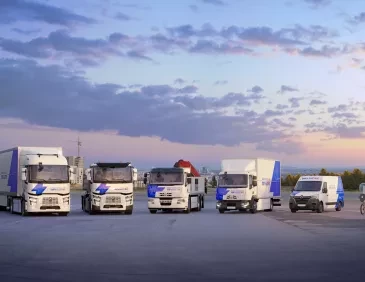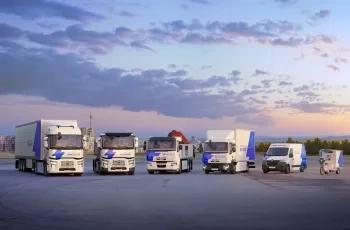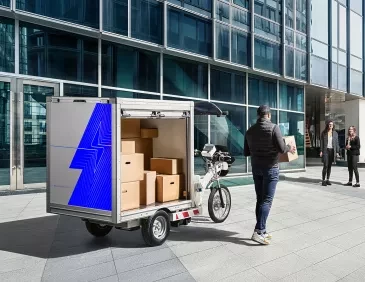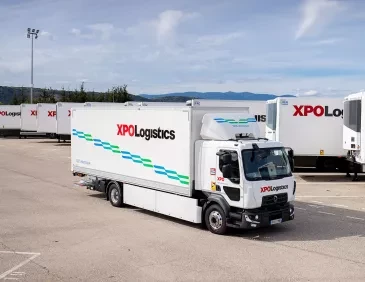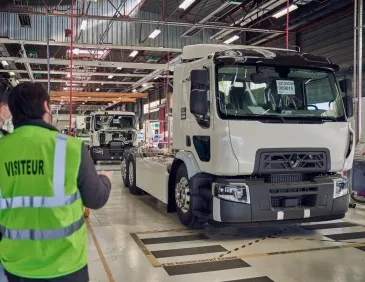Press release - 7 March 2023
Renault Trucks 2022 business results: energy transformation bolstered by solid performance
Renault Trucks ended 2022 with a total of 58,967 deliveries, up 15%. In a turbulent European market marked by major supply chain disruptions, the manufacturer strengthened its positions with a market share of 9.4% in the over-16 tonne segment, up by 0.6 points. With regard to electric mobility, Renault Trucks consolidated its positions in Europe with a 24.2% market share in the electric medium and heavy duty vehicles (MHDV) segment. On its domestic market, the manufacturer confirmed its leadership with a 29.4% market share in the over-16 tonne segment and a 75% market share for electric MHDV. These solid performances enable Renault Trucks to continue its energy transformation with confidence.
Renault Trucks' deliveries, up 15% in 2022, totaling 58,967 vehicles, breaks down as follows:
By destination:
Europe: 52,160 units (+13%)
Rest of the world: 6,807 units (+24%)
By tonnage:
Heavy and medium duty: 39,318 units (+17%)
Light commercial vehicles: 19,649 units (+10%)
Growth in results in Europe and a sharp acceleration in the decarbonisation of transport
- Increased market share in almost all European countries
In Europe (EU28), in the over-16 tonne segment, Renault Trucks saw its registrations rise in 19 countries, with a total market share of 9.4%, up 0.6 points. In the 6 to 16 tonne segment, the manufacturer lost 0.3 points of market share, closing at 7%.
In the medium and heavy duty segment, Renault Trucks' performance showed a marked rise in several European countries, including the Eastern zone, which includes Bulgaria, Romania, Ukraine and Hungary (+41%; 1,967 trucks), and Germany (+40%; 1,024 trucks). In France, Renault Trucks consolidated its leading position with a market share of 29.4%.
There was also strong growth in the light commercial vehicle market, particularly in Belgium (+23%; 1,763 vehicles) and the United Kingdom & Ireland (+22%; 3,108 vehicles)
These sustained performances in the traditional ranges enable Renault Trucks to confidently continue its transition to electric mobility.
- Accelerated transition to electric mobility
2022 was undoubtedly the year of decarbonised mobility for Renault Trucks. With the opening of an assembly line for Kleuster cargo bikes at its Lyon site, allowing for more agile and virtuous last-mile distribution, and the production of medium-duty electric trucks at the Renault Trucks plant in Blainville-sur-Orne, which passed the symbolic mark of 1,000 trucks, the manufacturer has established itself as a key player in electric mobility.
As proof of this, in Europe in 2022, Renault Trucks held 24.2% of registrations in the electric MHDV market and invoiced 379 Renault Trucks E-Tech D and D Wide. In France, Renault Trucks remains the undisputed leader in electric mobility with a 75% market share in the electric MHDV market.
Renault Trucks also invoiced 268 Renault Trucks E-Tech Master electric light commercial vehicles in 2022.
In 2022, many transport companies and local authorities chose Renault Trucks to help them switch to electric vehicles, including XPO in France, which announced an order for 100 electric trucks, the City of Barcelona, which purchased 73 Renault Trucks electric trucks for waste collection and street cleaning, Coca-Cola, which operates 30 Renault Trucks electric trucks for last-mile deliveries to its customers in Belgium, and Sepur, which has just put 18 Renault Trucks E-Tech D Wide into service to collect household waste from the entire 13th arrondissement of Paris.
The electric trucks of Renault Trucks' customers have already travelled a total of 4 million km, which is equivalent to a saving of 3,200 tonnes of CO2.
This trend is set to continue in 2023, as Renault Trucks registered over 1,700 orders for electric vehicles in 2022. At the end of 2023, the manufacturer will also begin production of electric heavy duty trucks, Renault Trucks E-Tech T for regional distribution and Renault Trucks E-Tech C for urban construction, at its Bourg-en-Bresse plant in France.
The arrival of Renault Trucks' all-electric heavy duty range in 2023 marks a major step forward by the manufacturer in favour of the decarbonisation of road freight transport. Renault Trucks is now the only manufacturer to offer electric mobility for all uses: from 650 kg cargo bikes to 44 tonne electric tractors and construction trucks. These electric vehicles are part of the full ecosystem for decarbonising transport proposed by Renault Trucks, which takes the form of tailor-made support for hauliers in their energy transition from the very first decision to decarbonise their fleet: from assessing and analysing needs to monitoring implementation and operation.
Renault Trucks is pursuing its ambition for 50% of its sales to be of all-electric vehicles by 2030.
A record year internationally
Renault Trucks' international sales continue to grow at a steady pace, increasing by 24% compared to 2021, representing 6,807 vehicles. The French manufacturer's positions are up in most countries, including Indonesia (10%), Chile (5.7%) and many African countries. Renault Trucks also achieved record market shares of 7.3% in Turkey and 16% in Saudi Arabia.
In addition to the volumes of vehicles invoiced, measures of satisfaction among Renault Trucks' international customers remained at high levels in 2022. Customers showed their loyalty to the manufacturer's workshops, which recorded a 24% increase in turnover in the spare parts business. Customer confidence was also reflected in the high penetration of service agreements: in Turkey, for example, the number of maintenance agreements doubled and more than half of the vehicles invoiced in 2022 were connected to Optifleet.
In this favourable context, new partners have joined Renault Trucks to support its expansion in Turkey, Algeria, Kenya, Angola and Tunisia.
Renault Trucks pursues its commitment to the circular economy
For Renault Trucks, the adoption of a circular economic model is one of the pillars for decarbonising the transport industry. By extending the life of a used truck or part, Renault Trucks reduces the impact on natural resources by up to 80%. This is a virtuous model based on three principles, namely regenerate, repurpose and recycle.
In 2022, Renault Trucks extended the life of 345 vehicles in its customers' fleets by reconditioning them in its Used Trucks Centre in Saint-Priest. The first fleet of reconditioned vehicles will be returned in mid-2023, which will enable Renault Trucks to evaluate this activity.
Renault Trucks also gave a second life to 132 used trucks, converted for new uses in its Used Trucks Factory in Bourg-en-Bresse. This number of converted vehicles, which is well below demand, is explained by the lack of availability of vehicles, with a historically low stock level (1,001 units), and by the fact that hauliers are keeping their trucks longer. As a direct consequence of this shortage, Renault Trucks' deliveries of used vehicles in 2022 are down by 25% compared to the previous year.
Achieving carbon neutrality by 2040
Renault Trucks has undertaken to step up the decarbonisation of its activities to help keep the rise in global temperature below 1.5°C by the end of the century. The manufacturer's objectives, established as part of the Science Based Target initiative (SBTi), are based on scientific data.
From 2040 onwards, Renault Trucks will only sell trucks that are 100% fossil free.
Press contact
Phone : +33 4 81 93 09 52
E-mail : severyne.molard@renault-trucks.com

